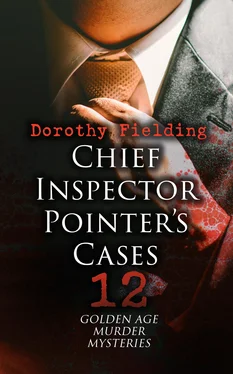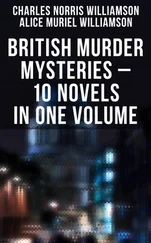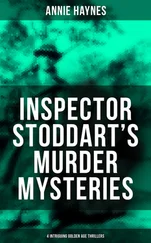"Indeed, sir!" Pointer was all attention. So were the others.
"She asked me if it were not possible for me to be with her on that evening. That last evening! I asked her if it was to go to the concert with her. She made me an odd reply. She said—the words are, as nearly as I can remember them, but the meaning is absolutely accurate—No. There is another place I am going to to-night where I should have liked you to be with me.' I took it lightly, 'A dance, eh?' She was fond of dancing, so am I. But she only said, 'As you are not coming it does not matter where it is.' I thought she was—piqued—I think you say—and I talked of something else. But now I see there was another explanation." He bit his lip and sighed "I tried to get her to say more, but my intended—" Di Monti, as always, had been talking with his hands as much as with his tongue. They now finished the sentence for him with a gesture that said, "You know how hard it was to make Rose speak when she did not want to." And they said it quite easily.
"Who do you think she was afraid of?"
"I have no faintest idea."
"There was some talk," Pointer went on, "you must excuse me if I pain you, there was some talk of a previous admirer—of a Mr. Bellairs."
Di Monti shrugged his shoulders. "I cannot say what I do not know. But the maid was right. I am sure that Miss Charteris was going to some definite place, possibly to meet some definite person, of whom she was in fear." He seemed unable to add more.
When he was gone, Pointer went up with Harris to Rose's studio, an empty room above her bedroom.
"Wonder where her sketches are? According to all the evidence, she was often out with her painting outfit. I want to see the result of so much industry. It looks as though that one drawing we have at the station is the only thing there is to show for the many sunset hours that Miss Charteris was supposed to've been working on the ruins. Ah, here's a sketch book! But only portraits. This one of the count is distinctly good, eh?"
Pointer was turning over the leaves as he spoke. "Suppose we take it with us and have a look at the ruins. I went yesterday as Brown, and learnt that Miss Charteris was often there mornings and evenings, including late on Thursday. At least, so a shepherd said. Know anything of the old fellow?"
"He's worked for Farmer Mason for forty years. Excellent character."
The scene by the abbey ruins that closed one end of the common was charming. Over the bright green turf gray and white sheep moved slowly along, browsing as they came. Above them, as though the earth were but changed reflection from on high, gray and white cloud swept steadily onward over another bright field, but deep blue this time, and vast and airy.
The shepherd, brown and wizened as a prune, touched his hat to Harris and looked keenly, at Pointer.
The superintendent opened briskly.
"Heard of the inquest?"
"Ay, master, I heard there wur to be one."
"Are you quite sure that you saw Miss Charteris Thursday evening, here?"
"I be. About an hour after sundown. Coming after nine, it wur."
"What was she doing?"
"Walking about. Taking notes of the moon on stones, like."
"You know that it's now thought that she was murdered?" Pointer spoke for the first time. As he had guessed, the man had not yet heard the real news of the day.
"Murdered! That young lamb! Missie murdered. Master, you"—his voice shook—"you fair 'maze me."
"The police are going to know about everyone who had any connection with the young lady. What about yourself? You've been a bit free with your money lately, I hear. Bought some fruit trees for your cottage, treated friends at the inn, and so on."
Pointer had made good use of yesterday afternoon. The shepherd looked at him with his clear old eyes. "Police yourself, master? High up on the roll-call likely?"
He nodded as Harris mentioned Pointer's rank. Then his mind went off to the more important facts.
"Murdered!" he repeated to himself. "Missie! Ay, now I wonder," he stood marking circles on the grass with his stick, "I do that!"
There was a little pause.
"I spoke naught but the truth when I said missie wur here night afore last, Thursday night. She wur here ten and she wur here afore that, but not so often as I may have led people to think, and never of a mornin'. She told me that she didn't care for drawing herself, but that her father he wur main set on it. So she slips me a shilling, or a crown even, now and again, to say to any askers that she come night a'ter night, and mornin' a'ter mornin'."
"How long would she stay?" Harris asked
"Long enough to hand me a bit of baccy or a summat, not longer."
"And then?"
"She'd go on by the short cut as she came by, on into the town."
"You never saw her go back this way?"
The shepherd shook his head. "Never. But come dark I fastens the sheep up in their hurdles, leaves Bob in charge, and I goes down for a bite and a sup before coming back for the night and all around ten."
"And how often was she out here?"
"She started coming a fortnight ago last Tuesday, and she comed twice that week, once the week after, and ivery even this last week from Monday to Thursday."
No questioning could shake him as to his certainty on these numbers.
"And you never saw anybody with her?"
"Never. But night afore last—Thursday—a gentleman come up after she wore gone by, and glances this way and that, looking for some un like, but he says naught."
"Did he go on, too, by the short cut into Medchester?"
"He come from theer, and went on towards Green Tree Farm."
That was also the direction of Stillwater House
Pointer produced the sketch book taken from Rose's studio.
"Is there any face among these drawings that reminds you of that gentleman?"
The shepherd turned over the pages with a chuckle, Though he shook his head at the trees.
"The branches of a noak, wi' the trunk of a birch! Eh, but she wore in a hurry, wore missie. You can't do naught wi' trees in a hurry. Longer than men they live, and they don't understand it. Time means naught to them. They don't understand—" He stopped. "Here he be." He laid a wrinkled finger on di Monti's portrait. "At least, if this baint he, 'tis none of t' others." This wind-up was feeble, but the old man would not commit himself more definitely.
"I think it's he, master, but I seed un but the once. It mightn't be he at all."
"You may have a chance to see the man himself before long. How did he strike you? You've a good eye for a man, I dare say."
Pointer offered the other some tobacco. The shepherd filled his clay pipe thoughtfully.
"Carried his head like a bellwether, he did. Set his feet down wi' a 'I lead you'm follow' sound to un. Ay," the old shepherd said from a cloud of smoke and reverie, "he wore a finely clad gentleman, to be sure, but he had a look to his face that night that made me think horns, and hoofs, and a tail, would a been his proper wear. Ay, master, it wore a look to chill you worse nor a Jannivary norther. And hearing what you've told me on today—" He broke off, and smoked another interval of thought away. "He wor the only man Bob was ever afeared on."
"Bob?"
"My mate. My dog. Bob he barked and growled when the gentleman come striding in among the sheep, for it wore latish, but he turns and says summat to Bob in his foreign tongue that fair humbled him."
"Foreign tongue, you say. Was he a foreigner, then?"
The shepherd ran a slow, bright eye over his questioners.
"Masing how the pollus has to learn from others," I mused.
Pointer and Harris laughed.
"Well, was he?"
"Ay, misters. The build on un would a told that. Ye don't get bones, slender and strong, like that wi' us. Nor an eye cut that shape. 'Tis the eye's cut that tells foreign blood in man or sheep."
Читать дальше












